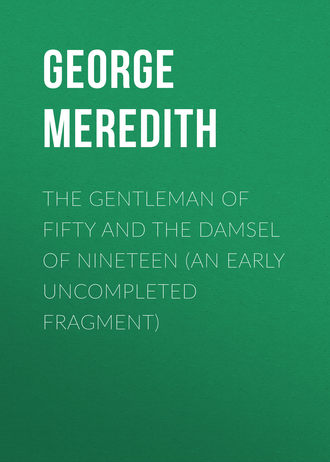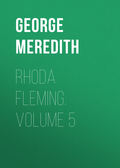
George Meredith
The Gentleman of Fifty and The Damsel of Nineteen (An early uncompleted fragment)
CHAPTER IV
SHE
Behold me installed in Dayton Manor House, and brought here for the express purpose (so Charles has written me word) of my being studied, that it may be seen whether I am worthy to be, on some august future occasion—possibly—a member (Oh, so much to mumble!) of this great family. Had I known it when I was leaving home, I should have countermanded the cording of my boxes. If you please, I do the packing, and not the cording. I must practise being polite, or I shall be horrifying these good people.
I am mortally offended. I am very very angry. I shall show temper. Indeed, I have shown it. Mr. Pollingray must and does think me a goose. Dear sir, and I think you are justified. If any one pretends to guess how, I have names to suit that person. I am a ninny, an ape, and mind I call myself these bad things because I deserve worse. I am flighty, I believe I am heartless. Charles is away, and I suffer no pangs. The truth is, I fancied myself so exceedingly penetrating, and it was my vanity looking in a glass. I saw something that answered to my nods and howd'ye-do's and—but I am ashamed, and so penitent I might begin making a collection of beetles. I cannot lift up my head.
Mr. Pollingray is such a different man from the one I had imagined! What that one was, I have now quite forgotten. I remember too clearly what the wretched guesser was. I have been three weeks at Dayton, and if my sisters know me when I return to the vicarage, they are not foolish virgins. For my part, I know that I shall always hate Mrs. Romer Pattlecombe, and that I am unjust to the good woman, but I do hate her, and I think the stories shocking, and wonder intensely what it was that I could have found in them to laugh at. I shall never laugh again for many years. Perhaps, when I am an old woman, I may. I wish the time had come. All young people seem to me so helplessly silly. I am one of them for the present, and have no hope that I can appear to be anything else. The young are a crowd—a shoal of small fry. Their elders are the select of the world.
On the morning of the day when I was to leave home for Dayton, a distance of eight miles, I looked out of my window while dressing—as early as halfpast seven—and I saw Mr. Pollingray's groom on horseback, leading up and down the walk a darling little, round, plump, black cob that made my heart leap with an immense bound of longing to be on it and away across the downs. And then the maid came to my door with a letter:
'Mr. Pollingray, in return for her considerate good behaviour and saving of trouble to him officially, begs his goddaughter to accept the accompanying little animal: height 14 h., age 31 years; hunts, is sure- footed, and likely to be the best jumper in the county.'
I flew downstairs. I rushed out of the house and up to my treasure, and kissed his nose and stroked his mane. I could not get my fingers away from him. Horses are so like the very best and beautifullest of women when you caress them. They show their pleasure so at being petted. They curve their necks, and paw, and look proud. They take your flattery like sunshine and are lovely in it. I kissed my beauty, peering at his black- mottled skin, which is like Allingborough Heath in the twilight. The smell of his new saddle and bridle-leather was sweeter than a garden to me. The man handed me a large riding-whip mounted with silver. I longed to jump up and ride till midnight.
Then mama and papa came out and read the note and looked, at my darling little cob, and my sisters saw him and kissed me, for they are not envious girls. The most distressing thing was that we had not a riding- habit in the family. I was ready to wear any sort. I would have ridden as a guy rather than not ride at all. But mama gave me a promise that in two days a riding-habit should be sent on to Dayton, and I had to let my pet be led back from where he came. I had no life till I was following him. I could have believed him to be a fairy prince who had charmed me. I called him Prince Leboo, because he was black and good. I forgive anybody who talks about first love after what my experience has been with Prince Leboo.
What papa thought of the present I do not know, but I know very well what mama thought: and for my part I thought everything, not distinctly including that, for I could not suppose such selfishness in one so generous as Mr. Pollingray. But I came to Dayton in a state of arrogant pride, that gave assurance if not ease to my manners. I thanked Mr. Pollingray warmly, but in a way to let him see it was the matter of a horse between us. 'You give, I register thanks, and there's an end.'
'He thinks me a fool! a fool!
'My habit,' I said, 'comes after me. I hope we shall have some rides together.'
'Many,' replied Mr. Pollingray, and his bow inflated me with ideas of my condescension.
And because Miss Pollingray (Queen Elizabeth he calls her) looked half sad, I read it—! I do not write what I read it to be.
Behold the uttermost fool of all female creation led over the house by
Mr. Pollingray. He showed me the family pictures.
'I am no judge of pictures, Mr. Pollingray.'
'You will learn to see the merits of these.'
'I'm afraid not, though I were to study them for years.'
'You may have that opportunity.'
'Oh! that is more than I can expect.'
'You will develop intelligence on such subjects by and by.'
A dull sort of distant blow struck me in this remark; but I paid no heed to it.
He led me over the gardens and the grounds. The Great John Methlyn Pollingray planted those trees, and designed the house, and the flower- garden still speaks of his task; but he is not my master, and consequently I could not share his three great-grandsons' veneration for him. There are high fir-woods and beech woods, and a long ascending narrow meadow between them, through which a brook falls in continual cascades. It is the sort of scene I love, for it has a woodland grandeur and seclusion that leads, me to think, and makes a better girl of me. But what I said was: 'Yes, it is the place of all others to come and settle in for the evening of one's days.'
'You could not take to it now?' said Mr. Pollingray.
'Now?' my expression of face must have been a picture.
'You feel called upon to decline such a residence in the morning of your days?'
He persisted in looking at me as he spoke, and I felt like something withering scarlet.
I am convinced he saw through me, while his face was polished brass. My self-possession returned, for my pride was not to be dispersed immediately.
'Please, take me to the stables,' I entreated; and there I was at home.
There I saw my Prince Leboo, and gave him a thousand caresses.'
'He knows me already,' I said.
Then he is some degrees in advance of me,' said Mr. Pollingray.
Is not cold dissection of one's character a cruel proceeding? And I think, too, that a form of hospitality like this by which I am invited to be analysed at leisure, is both mean and base. I have been kindly treated and I am grateful, but I do still say (even though I may have improved under it) it is unfair.
To proceed: the dinner hour arrived. The atmosphere of his own house seems to favour Mr. Pollingray as certain soils and sites favour others. He walked into the dining-room between us with his hands behind him, talking to us both so easily and smoothly cheerfully—naturally and pleasantly—inimitable by any young man! You hardly feel the change of room. We were but three at table, but there was no lack of entertainment. Mr. Pollingray is an admirable host; he talks just enough himself and helps you to talk. What does comfort me is that it gives him real pleasure to see a hearty appetite. Young men, I know it for a certainty, never quite like us to be so human. Ah! which is right? I would not miss the faith in our nobler essence which Charles has. But, if it nobler? One who has lived longer in the world ought to know better, and Mr. Pollingray approves of naturalness in everything. I have now seen through Charles's eyes for several months; so implicitly that I am timid when I dream of trusting to another's judgement. It is, however, a fact that I am not quite natural with Charles.
Every day Mr. Pollingray puts on evening dress out of deference to his sister. If young men had these good habits they would gain our respect, and lose their own self-esteem less early.
After dinner I sang. Then Mr. Pollingray read an amusing essay to us, and retired to his library. Miss Pollingray sat and talked to me of her brother, and of her nephew—for whom it is that Mr. Pollingray is beginning to receive company, and is going into society. Charles's subsequently received letter explained the 'receive company.' I could not comprehend it at the time.
'The house has been shut up for years, or rarely inhabited by us for more than a month in the year. Mr. Pollingray prefers France. All his asociations, I may say his sympathies, are in France. Latterly he seems to have changed a little; but from Normandy to Touraine and Dauphiny—we had a triangular home over there. Indeed, we have it still. I am never certain of my brother.'
While Miss Pollingray was speaking, my eyes were fixed on a Vidal crayon drawing, faintly coloured with chalks, of a foreign lady—I could have sworn to her being French—young, quite girlish, I doubt if her age was more than mine.
She is pretty, is she not?' said Miss Pollingray.
She is almost beautiful,' I exclaimed, and Miss Pollingray, seeing my curiosity, was kind enough not to keep me in suspense.
'That is the Marquise de Mazardouin—nee Louise de Riverolles. You will see other portraits of her in the house. This is the most youthful of them, if I except one representing a baby, and bearing her initials.'
I remembered having noticed a similarity of feature in some of the portraits in the different rooms. My longing to look at them again was like a sudden jet of flame within me. There was no chance of seeing them till morning; so, promising myself to dream of the face before me, I dozed through a conversation with my hostess, until I had got the French lady's eyes and hair and general outline stamped accurately, as I hoped, on my mind. I was no sooner on my way to bed than all had faded. The torment of trying to conjure up that face was inconceivable. I lay, and tossed, and turned to right and to left, and scattered my sleep; but by and by my thoughts reverted to Mr. Pollingray, and then like sympathetic ink held to the heat, I beheld her again; but vividly, as she must have been when she was sitting to the artist. The hair was naturally crisped, waving thrice over the forehead and brushed clean from the temples, showing the small ears, and tied in a knot loosely behind. Her eyebrows were thick and dark, but soft; flowing eyebrows; far lovelier, to my thinking, than any pencilled arch. Dark eyes, and full, not prominent. I find little expression of inward sentiment in very prominent eyes. On the contrary they seem to have a fish-like dependency of gaze on what is without, and show fishy depths, if any. For instance, my eyes are rather prominent, and I am just the little fool—but the French lady is my theme. Madame la Marquise, your eyes are sweeter to me than celestial. I never saw such candour and unaffected innocence in eyes before. Accept the compliment of the pauvre Anglaise. Did you do mischief with them? Did Vidal's delicate sketch do justice to you? Your lips and chin and your throat all repose in such girlish grace, that if ever it is my good fortune to see you, you will not be aged to me!
I slept and dreamed of her.
In the morning, I felt certain that she had often said: 'Mon cher Gilbert,' to Mr. Pollingray. Had he ever said: 'Ma chere Louise?' He might have said: 'Ma bien aimee!' for it was a face to be loved.
My change of feeling towards him dates from that morning. He had previously seemed to me a man so much older. I perceived in him now a youthfulness beyond mere vigour of frame. I could not detach him from my dreams of the night. He insists upon addressing me by the terms of our 'official' relationship, as if he made it a principle of our intercourse.
'Well, and is your godpapa to congratulate you on your having had a quiet rest?' was his greeting.
I answered stupidly: 'Oh, yes, thank you,' and would have given worlds for the courage to reply in French, but I distrusted my accent. At breakfast, the opportunity or rather the excuse for an attempt, was offered. His French valet, Francois, waits on him at breakfast. Mr. Pollingray and his sister asked for things in the French tongue, and, as if fearing some breach of civility, Mr. Pollingray asked me if I knew French.
Yes, I know it; that is, I understand it,' I stuttered. Allons, nous parlerons francais,' said he. But I shook my head, and remained like a silly mute.
I was induced towards the close of the meal to come out with a few French words. I was utterly shamefaced. Mr. Pollingray has got the French manner of protesting that one is all but perfect in one's speaking. I know how absurd it must have sounded. But I felt his kindness, and in my heart I thanked him humbly. I believe now that a residence in France does not deteriorate an Englishman. Mr. Pollingray, when in his own house, has the best qualities of the two countries. He is gay, and, yes, while he makes a study of me, I am making a study of him. Which of us two will know the other first? He was papa's college friend—papa's junior, of course, and infinitely more papa's junior now. I observe that weakness in him, I mean, his clinging to youthfulness, less and less; but I do see it, I cannot be quite in error. The truth is, I begin to feel that I cannot venture to mistrust my infallible judgement, or I shall have no confidence in myself at all.
After breakfast, I was handed over to Miss Pollingray, with the intimation that I should not see him till dinner.
'Gilbert is anxious to cultivate the society of his English neighbours, now that he has, as he supposes, really settled among them,' she remarked to me. 'At his time of life, the desire to be useful is almost a malady. But, he cherishes the poor, and that is more than an occupation, it is a virtue.'







